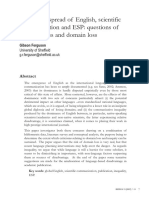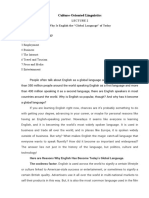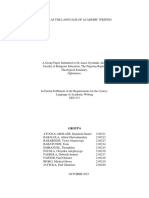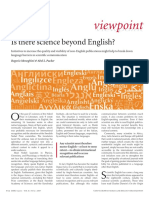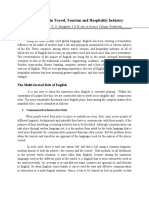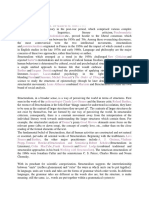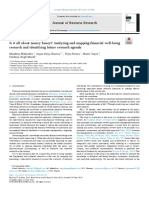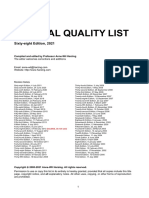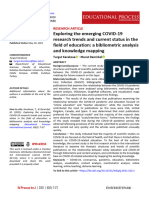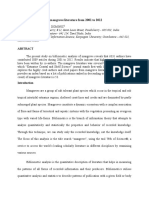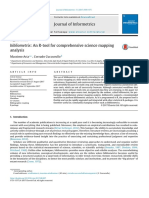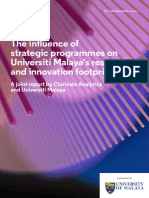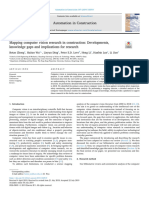Research Journal of English Language and Literature (RJELAL) A Peer Reviewed International
Journal -
RESEARCH ARTICLE
ADDRESSING ENGLISH AS UNIVERSAL LANGUAGE OF SCIENCE SHEME MARY P U PhD student,
Research and PG Department of English, St Thomas College, Thrissur, Kerala, India
ABSTRACT A language is always equated in terms with communicative purpose. At the same members of the scientific
time it also serves as a link between different people, a window to the developments and as a community work together
bridge to different cultures. In this paper, the importance, status and the role of English for the betterment of
language is addressed specially in the development of science. The paper also analyzes how a humanity. KEY WORDS:
language acts as a tool in the process of global communication of scientific research. The English, Science, Language
distinct challenges faced by scientists who are not native speakers of English are also SHEME MARY P U
discussed. It is concluded that the position maintained by English language need to be retained Article info:
for universal dissemination of scientific knowledge keeping in view the limitations of those Article Received :29/06/2013
who are not the native speakers of English language and this can best be achieved when all Revised from :01/07/13
Accepted 07/07/2013
�INTRODUCTION
English today is the third most common native language in the world, after Mandarin and Spanish and around 378
million people speak English as their first language. Mandarin and Spanish is limited to certain geographical areas
of the world whereas English has broken down the barriers of the nations and brought the people closer. English
being the universal language serves as a link between different people, a window to the developments and as a
bridge to different culture. Likewise, English is now used almost exclusively as the universal language of
disseminating knowledge in science and technology. Roughly 80% of all the journals indexed in bibliographic
databases are published in English. Therefore, by learning a single language, scientists around the globe can access
the various publications in their area of interest and can communicate with other scientists working in related fields
anywhere in the world. A vast amount of scientific and technological developments has come out in the form of
books, periodicals, journals and manuals which are mostly available in English language giving it the status of
Library language( Baruah, 5). The use of English by scientist all over the world makes the language more dynamic
by enriching the vocabulary of the language. However, the use of English as the universal scientific language creates
distinct challenges for those who are not native speakers of English (Drubbin and Kellog, 1399). Moreover, the
supremacy of the English language in the field of science, including education, research, publications, seminars,
workshops, conferences and scientific symposia, could lead to Research Journal of English Language
and Literature (RJELAL) A Peer Reviewed International Journal - http://www.rjelal.com
Vol.1.Issue.2.;2013 116 ADDRESSING ENGLISH AS UNIVERSAL LANGUAGE OF SCIENCE I SHEME MARY P U
�poorer outcomes in the field of research and development because of the possible exclusion of those not able or
not willing to adapt. It might also contribute to the gradual elimination of other languages and other cultures, with
unknown consequences for the advancement of science and technology. This paper discusses the potential
benefits and demerits of using English as a single language of science. MATERIALS AND METHODS A general search
was carried out in bibliographic databases such as Science Direct, PubMed, Google scholar and Web of Science to
get available information about the predominant languages used in writing scientific articles. The role played by
English language in the dissemination of scientific knowledge through various means such as journals, web,
education and research was analyzed. The relative importance of language learning in the curriculum of science
scholars is also examined. Language biases in the comparison, evaluation and ranking of journals is also studied.
RESULTS AND DISCUSSION
Globalization is one aspect of the larger phenomenon of modernization, which describes societies characterized by
progressive growth in the complexity of communications (Charlton and Andras 869). Despite its inevitable
problems, globalization is a generally desirable phenomenon, since it enables increased efficiency, effectiveness
and capability of societies and thereby, potentially benefits most people most of the time (Charlton and Andras
869). Globalization in business, education, research, politics, culture and other aspects of our everyday life is
viewed by many as an inevitable reality. Scientific research was one of the first global communication systems,
especially at its most advanced levels and high quality scientific research and education at post doctoral level is
essentially global. The lower levels of science education at doctoral, undergraduate, and even school teaching
levels is also getting globalized progressively (Falagas et al., 655). The increasing role of English in science can be
observed through the analysis of the language used in scientific journals. These journals, either in print or web, play
an important role in the advancement of science, since they are one of the main channels used by scientists for the
dissemination of their discoveries and inventions (Bordons and Gomez, 189). The ratio of the number of research
articles published in English and in the official languages of various countries during 1996 to 2011 was studied by
Weijen (7). The results of the study show that the use of English has continued to rise strongly in the Netherlands,
Italy and the Russian Federation during 1996 to 2011 (Weijen, 8). The trend in using English language in scientific
publications increased to a certain extent in Germany, but remained relatively stable in France, Spain and China
(Weijen, 8). However, in Brazil, the ratio between the use of English and Portuguese was decreasing, although this
might be due in part to an increase in the coverage of Brazilian journals published in Portuguese in various
bibliographic databases. However, overall, the use of English continues to increase over time (Weijen, 8).
Biodiversity in every ecosystem is viewed as an important factor in the maintenance of a balanced and healthy
environment (Falagas et al., 655). A similar diversity in languages and cultures plays a significant role in the
advancement of science. It is estimated that below 15% of the worlds population speaks English, with just 5%
belonging to native English speaking community. For scientists whose mother tongue is not English, writing
research articles and projects, applying grants from universal funding institutions, preparing presentations, and
communicating directly with other scientists in English is much more challenging than it is for native speakers of
English (Drubbin and Kellog, 1399). Moreover, when an article is submitted in an international journal published in
English language by a scientist belonging to non English speaking nation, the manuscript reviewers often focus on
criticizing their English, rather than evaluating the scientific results and logics. This makes it difficult for their
manuscripts to get a fair review and, ultimately, to be accepted for getting published. Therefore, the difficulties
faced by the nonnative speakers of English needs to be recognized and alleviated by the global scientific
community. Reviewers and editors can suggest the authors to seek Research Journal of English
Language and Literature (RJELAL) A Peer Reviewed International Journal -
�assistance from experts or professional editing agencies in preparing and revising the manuscripts. In addition the
journals should employ copyeditors, to correct any lingering errors in language and grammar before final
acceptance and publication of an article. The problems faced by the scientist who are non native speakers of
English can be alleviated to a certain extent by introducing a curriculum giving special thrust on language learning
aiming at achieving proficiency in the language. Language biases also play key role in the comparison, evaluation
and ranking of journals based on impact factor, due to the simple fact that the science citation indices also covers
non-English language journals of which the papers have a considerably lower impact than those in the English-
language journals. The fact that English is the lingua franca of science is not likely to change anytime soon (Drubbin
and Kellog, 1399). In this context, it seems logical to consider that English should be used in international scientific
journals, mainly those covering basic research and aiming at reaching the global community, while national
languages should be the most appropriate choice for those journals oriented towards the national readers,
generally those focusing topics of local interest (Bordons and Gomez, 190). Moreover, advancement of science and
technology depends on the elimination of hurdles faced by nonnative speakers of the English language and this can
best be achieved when all members of the scientific community work together for the betterment of humanity.
REFERENCES Baruah, T.C. The English Teachers Handbook. NewDelhi: Sterling, 2004. Print. Bordons, M. and
Gomez, I. Towards a single language in science? A Spanish view. Serials 17.2 (2004): 189-95. Web. Charlton B.G.
and Andras P. Globalization in science education: an inevitable and beneficial trend. Med Hypotheses. 66.5
(2006): 869-73. Web.
Drubin D.G. and Kellogg D.R. English as the universal language of science: opportunities and challenges.
Molecular Biology of the Cell. 23 (2012): 1399. Print.
Falagas, M.E., Fabritsi, E, Chelvatzoglou, F.C. and Rellos, K. Penetration of the English language in science: the case
of a German national interdisciplinary critical care conference. Critical Care. 9.6 (2005): 655-56. Web. Weijen, D
van. The Language of (Future) Scientific Communication, Research trends. 31, (2012) 7-8 Web.



